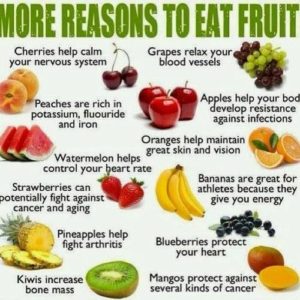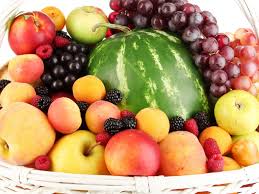You say WHY?
Let’s look at the health aspects of them for our body:
1- They are high in vitamins, minerals, some with antitoxins (helping the immune system) and have anti-inflammatory effects that can help you build up to your optimal health. Some fruits have soluble fiber in them that slows down the breakdown of complex carbohydrates and helps reduce blood sugar.
2- Fruit taken in proper portions (moderate amts.) can even help lower blood cholesterol.
3- Soluble fiber is not just in rye, barley, oats, and vegetables but in fruits as well. Insoluble fiber can’t be absorbed or digested by the human body but can still provide the body with advantages like reducing hunger, stimulates regular bowel movements, and can be found in fruits as well as vegetables, seeds whole wheat bread and other foods.
Let’s look at what you look for in the food you put in your body:
One of my healthy eating rules is know what the food’s makeup is before eating it; yes this includes calories, fat, sugars, carbs and sodium but knowing the energy density in the foods you eat is very important too. Foods with the lowest density are foods that help curb your appetite that can help you maintain or even lose weight.
The lowest energy density food group contains healthy foods like most vegetables and fruits with based broth soups & skim milk. The highest density groups are cookies, chips, nuts, full-fat condiments, chocolate and butter (not the best nutritional foods to be eating regularly). Remember, if you’re trying to be healthy or even losing weight than know fruits are high glycemic foods. If you eat too much fruit at one time it will result in high glycemic amounts in your body at that one time putting you at risk for fat storage=weight gain.
You see, digestion of the foods whether calories, carbohydrates, sugars, or some fats get broken down into simple or complex sugar molecules=glucose or fructose. One of the body’s major fuels for energy so we can function with working properly & survive is glucose (the same concept like fuel for a car=gas=it operates).
The body utilizes glucose after digestion takes place in the stomach where the foods break down into simple and complex sugars than transferred into our bloodstream as our active fuel for energy (like our car’s tank sending gas to the engine to be able to run). Our fuel, being the glucose, then gets sent to all our tissues and into our cells but only for the amount they need at that time (sort of like the car in filling the gas tank to full). When our body reaches full for all energy needed to all areas of the body at that time if there is extra un-needed glucose in the bloodstream it has to go somewhere and the body stores it=fat storage=weight gain. In the diabetic if no insulin too pass the sugar over through the cell membrane in the red blood cell (RBC) or if all extra sugar that can go into RBCs is full than the sugar has to to go somewhere.
Take the car, the storage reservoir is the gas tank it only stores in the tank, but if the tank reaches full with gas (its energy) it would just overflow as opposed to the human body with extra glucose in the bloodstream=our extra fuel which doesn’t overflow by leaving our body somehow but gets stored in our body as fat storage. Thus, when it’s needed (glucose) it will be released back in the bloodstream. If you more frequently have in your body more overflow of glucose versus the need for it you’ll have more fat storage occuring as opposed to energy utilized by the body. This causes you to be at a higher risk of becoming overweight to obese (that’s the logic in eating 6 small low glycemic meals a day which prevents this from happening).
To prevent a high risk of becoming overweight to obese stay off of 3 large meals/day and high sugar snacks during the day. Also, don’t have constant healthy frequent high glycemic meals day in and day out especially with no activity/exercise other than your regular activities of daily living, which doesn’t count as exercise.
Remember, eat fruits in moderation not in excess; including the size of your meals (don’t allow the size of the plate greater than 9” including NO second helpings). The key to eating healthy is to include all 4 food groups (Meats/Fishes, Vegetables, Fruits, and Dairy) and eat your first meal for the day within 30 minutes. You can also learn exercise that fits into your lifestyle (ranging from walking fast 30 minutes for 2 to 3 times a week to daily workouts) with knowing healthy habits to add in your life to stay or get within your ideal weight. The ending result is you feel better, look better, and have higher odds you’ll live a longer life that allows more excitement in it due to being in better shape. Good luck in getting yourself on the right track of health independently.

